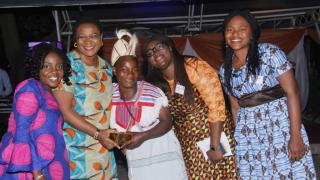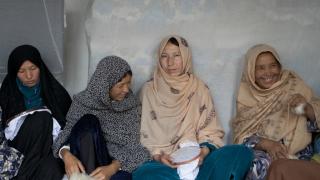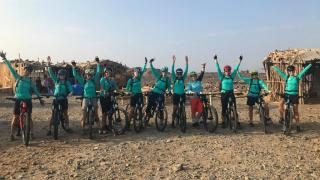From Primary School Dropout to Entrepreneur
One of our Rwanda programme graduates, Clarisse, shares her inspiring story of beating the odds to become a successful businesswoman
I had to drop out after primary school, because my parents were very poor and could not afford to pay my school fees any more.
I immediately started farming to earn some money, planting cassava in my parents’ garden. With the money from my first cassava harvest, I paid a friend to teach me tailoring – because it was always my dream to make clothes. The following harvest, I earned enough to buy a sewing machine. I started making simple clothes, which brought in a bit of money, but I didn’t have enough skills to make the different styles my customers wanted.
After I got married in 2012, my husband became the breadwinner. He tried to start a business, but earned very little – he had no farmland, so he had to rent other people’s land which was very costly. We had hardly anything to eat. I used to think that I could not do business and succeed, I thought women are no good at business and I didn’t even dare to try.
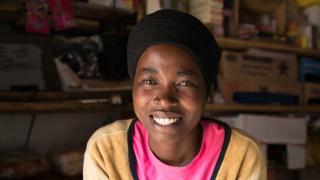
Then, three years ago, I was very lucky to be selected to join the Women for Women International programme in my village. It felt so good being in a group of women studying together. We shared experiences, we could laugh, and I enjoyed the training workshops so much.
Our business skills trainer made me believe that women can also do business and improve our family’s finances. This gave me confidence to discuss it with my husband – and he promised to support me. We put together our savings, and used the money to buy second-hand t-shirts and children’s clothes. When I started selling these at the market, I got so many customers. I use all the skills I learned from the training sessions on book-keeping to manage my business.
I acquired many other skills during the programme, such as how to keep track of household income and expenditure.
Before, I used to spend more than we earned. But now, I can budget for my family and manage my spending wisely. I used to think there was only one way to save money - at the bank. But we learned about forming savings groups, saving at home using a cash box, and buying assets – such as goats, rabbits and pigs – that can be a source of household income. The 25 members of my class formed a savings group and each of us saves 1,100 Rwandan Francs (RWF) per month [about 95p]. I also keep a personal savings box at home, and put in a portion of what I earn each day. I can now help my husband meet the household needs.
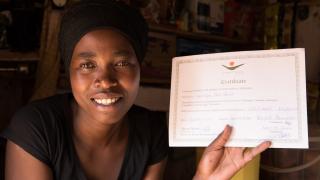
I received a letter from my Women for Women International Stand With Her supporter which encouraged me even more. She wrote to me telling me about the factories she owns, and she promised to keep praying for me to succeed in life. I was so inspired by this letter. I am motivated to work even harder, so that if she comes to visit me, she will be able see that I am doing well for myself.
Since graduating from the programme in 2016, my husband and I used some of our earnings to rent a shop, where we sell bananas and other types of food. Now, my husband runs this shop and brings in 5,000 RWF [about £4.20] per day.
Thanks to the training that I got from Women for Women International, I became confident and could exchange ideas with my husband.
Once you have proved to your husband that you can contribute to the household income, you have successfully established that mutual respect.
During the programme, I learned how to look for business opportunities in my area. I noticed that there was no photo studio in our community, despite a big demand for this service. I managed to convince my husband that we should to get a loan to buy a camera. My husband is now employed as a photographer at local events and ceremonies. We earn around 20,000 RWF [about £16.75] per ceremony or more, and are steadily paying off the loan for the camera.
I hope to be able to buy a piece of land for our kids and save for future, and even be able to afford their higher education if they perform well in school.
Doing business has enabled us to become active citizens. I do not hesitate to pay taxes, because I want to play a role in developing my country.
I am so grateful to my Stand With her supporter for all the support invested in me and I am determined to continue working hard to improve our family’s situation. Life has changed and I’m no longer the same.
Tuyisenge Marie Clarisse is 32 years old. She is married, and has one son, who is 3 years old. Clarisse lives with her husband and son in Gasharu, southern Rwanda. Gasharu is a remote village in Muhanga District with high levels of poverty and unemployment. Women in this area face inequality and gender-based violence.
Continue reading
Solar Sisters
subtitle:
We are incredibly proud and inspired by two of our programme graduates in Nigeria who have been recognised for their outstanding achievements marketing and selling clean energy products in their communities.
When it comes to protecting women’s rights in conflict-affected countries, it’s time to turn resolutions into reality. The UK’s new Plan is a step in the right direction.
Cycling Through the Gateway to Hell
subtitle:
In November 2017, 12 women embarked on a two-week Mountain Biking Expedition across the Danakil Depression of Ethiopia, to raise funds for our work with women in countries affected by conflict.

